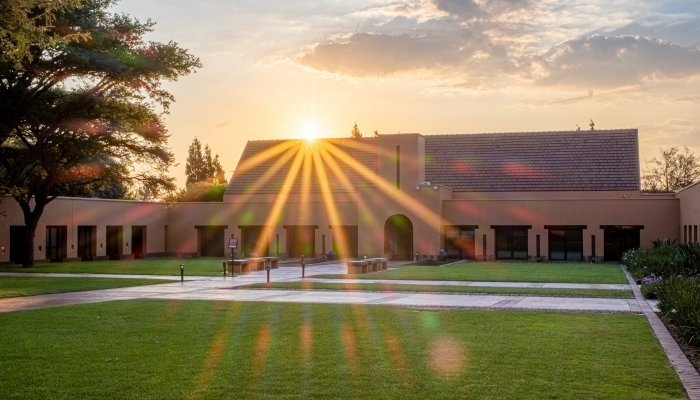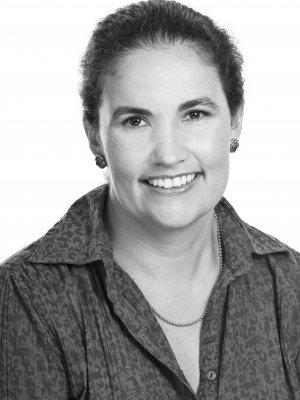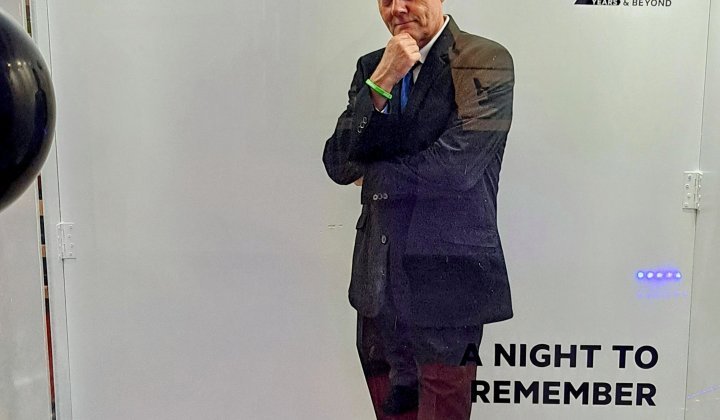The rigour and dynamism of the GIBS way embodies the very essence of the upstart University of Pretoria (UP) institution that was born out of five points jotted down on a napkin in a way station overlooking the N1 highway. From audacious beginnings, the leaders steering the GIBS ship have consolidated its brand as a globally respected institution, while continuing to position the school as a relevant force within business and society.
Breaking ground: The Binedell legacy
During a 2014 interview with SABC News, Professor Nick Binedell noted how, in the early years, many doubted GIBS would have a place in a market that already boasted a number of established business schools. Binedell, however, saw a gap in positioning GIBS as the business school close to business.
“We tried to find a different angle,” he recalled. “I spent a lot of time having many cups of tea with CEOs asking them how they saw at the time – and this was 1999 – the 21st century and the challenges business would face. And we took from those lessons some insights that really helped us start the school.”
Binedell and the founding team also drew freely on lessons gleaned from leading business schools around the world, replicating approaches that resonated while always tweaking concepts to suit the South African market.
Eighteen months after Binedell presented his napkin vision to Johan van Zyl, then vice-chancellor of UP – and with generous funding secured from businessperson Donald Gordon’s Gordon Foundation – the Gordon Institute of Business Science (GIBS) opened in January 2000.
At the time, South Africa was desperately in need of management and leadership skills, and GIBS was able to inject an entrepreneurial energy into the already successful global general management approach. The demand was certainly there and by 2015, when Binedell handed the reins to Professor Nicola Kleyn, GIBS was riding high and entering a maturation phase.
Growing up: The Kleyn era
Kleyn’s five-year deanship is notable for a focus on maturing systems and processes. This, she said, was typical of the lifecycle of a business as it builds on the goodwill, trust, and energy created during the early years. “Without efficient systems and processes you are duplicating and wasting resources and putting the brand at risk,” she noted.
Under Kleyn, diversity and representation visibly shifted to include more black members of faculty and in executive management positions. Initiatives were also put in place to build greater workplace flexibility, including working from home where possible.
As dean, Kleyn weathered the aftermath of the 2008 global financial crisis, the 2009-2019 European debt crisis, the leaking of the Panama Papers in 2016, the first inauguration of Donald Trump as US president in 2017, the US-China trade war, and the 2020 Covid-19 pandemic.
There were some major corporate scandals during that period too, with the Steinhoff accounting scandal breaking in 2017, VBS Bank in 2018, and Tongaat Hulett in 2019, and with the leaked Gupta emails surfacing in 2017.
These significant global shifts, together with fast-paced change and a strong focus on governance and sustainability, meant that executive education continued to evolve swiftly. GIBS was required to stretch itself and its offerings, becoming more agile, and building in even faster lead times. The talent needs of companies also began to shift, moving away from long and structured interventions to more practical and compact blended learning opportunities. It proved a move that helped GIBS transition rapidly in the face of the global pandemic when face-to-face teaching was suspended.
As Kleyn wrote in a 2020 EFMD Global blog, GIBS’s “investment in technology across recent years to enable both online delivery and working from home” proved an advantage, as did the school’s culture of experimentation. “The school’s rapid response to the crisis can be attributed to its entrepreneurial culture, which has characterised its character since its inception in 2000,” she wrote.
In September 2020, Kleyn took up a new post as dean of executive education at Rotterdam School of Management, Erasmus University in the Netherlands.
Transforming with heart: The Mthombeni years
It was during Morris Mthombeni’s tenure as interim dean that GIBS attained the coveted Triple Crown accreditation, an achievement fewer than 1% of global business schools can claim. This would prove to be just the first in a series of powerful moves during this phase, which reaffirmed GIBS’s role as a key African collaborator on the world stage, and a crucial voice for the role of business in society.
Bearing in mind the unique demands on businesses operating in a society as unequal as South Africa, Mthombeni’s approach proved inclusive, responsive, responsible, forward-thinking, globally relevant, and Africa orientated. Mthombeni drove home the point that “a society that is better educated is less vulnerable, is more connected, and more engaged is good for business… By making a small contribution through various partnerships, we can make a difference in areas where you might not expect to find a business school operating.”
This approach included driving female leadership representation across society, in line with the United Nations’ Sustainable Development Goal (SDG) Five and as part of GIBS’s commitment to building on the progress made since 1994 to ensure gender parity in the workplace — particularly in senior and executive leadership roles.
As a member of the UN’s Principles for Responsible Management Education (PRME) and PRME Chapter Africa, Mthombeni joined a core group of African business school deans taking part in the Business Schools for Climate Leadership (BS4CL) Africa initiative. He continues to serve as a PRME board member.
This increasingly collaborative and forward-thinking approach continued to shift the dial from being a school for business to being a “school for good”, as Mthombeni put it. As he explained in an article by Luleka Mzamo, GIBS’s head of communications and stakeholder management, this reflects the broader, systemic, and sustainable lens which continues to be embedded in the GIBS philosophy.
Under Mthombeni’s watchful eye, careful attention has been given to embedding responsible management education into the curriculum, while broadening the avenues through which students can gain entry into the coveted GIBS MBA. In addition to adding elements of gamification and innovating with technology, the evolution of the school’s flagship MBA means students now have access to more than 90 electives. In addition, MBA candidates can choose from seven different focus areas, namely: general management, consulting, entrepreneurship, manufacturing, healthcare, climate leadership, and, most recently, digital leadership.
As Professor Manoj Chiba, newly appointed GIBS MBA director, noted in a recent blog post, “Executive education was evolving to embrace innovations like micro-courses, online and blended learning, and fast-paced technological shifts such as big data, artificial intelligence, and augmented reality. No aspect of business education can afford to ignore these groundbreaking developments, especially the stalwart MBA degree.”
Leading the way
From the early days at 25 Fricker Road, a host of influential and forward-thinking leaders have helped steer the business school on its uniquely entrepreneurial path.
Chief among these inspiring leaders is Emeritus Professor Karl Hofmeyr. He was a full-time professor at GIBS from 1999 to 2021, and was responsible for custom programmes between 1999 and 2009. Former Dean Nick Binedell once referred to Hofmeyr as the yin to his yang. In a 2019 interview, Binedell said, “He was my alter ego. He’s a wonderful man.”
As part of the founding team, along with former marketing head Sue Swart and Beulah Muller, GIBS associate director for knowledge and information services, the new business school provided fertile ground for the development of enterprising leaders who were willing and able to be stretched in the pursuit of Binedell’s bigger, bolder vision.
Shireen Chengadu, director of the GIBS MBA programme from 2002 to 2013 and former executive director of the Centre for Leadership & Dialogue from 2013 to 2016, also falls into this number. Under her watch the GIBS MBA rapidly gained a reputation as an essential ingredient in the executive development pipeline, and for offering a demanding but supportive learning environment.
Hofmeyr also played a central role, alongside Binedell, former GIBS director Jonathan Cook and Professor David Beaty in embedding executive coaching into the school’s ethos, culminating in the establishment of Personal and Applied Learning (PAL) in 2005. Alison Reid, incumbent head of PAL, joined GIBS in 2007 and continues to drive wellness and personal development as a golden thread across the business school.
Academic impact
The leaders driving GIBS forward today continue to build on this legacy, with deputy dean and executive director for faculty Louise Whittaker serving on the PRME SIP Impact Sub-Committee, which was established in 2020 to provide support and guidance to schools committed to the Principles of Responsible Management Education (PRME).
In her inaugural lecture in 2023, Professor Whittaker specifically noted the daunting process of gaining full professorship as part of the “research-intensive” University of Pretoria (UP) and GIBS. Indeed this strong focus on quality research and academic output has been a clear priority across successive UP vice-chancellors, from Johan Van Zyl (1997-2001) and Professor Calie Pistorius (2001-2009) to Professor Cheryl de la Rey (2009-2018), Professor Tawana Kupe (2019-2023), Professor Themba Mosia (interim, 2023-2024) and Professor Francis Petersen (2024-present).
Embracing innovation
What continues to differentiate GIBS as a business school is an appetite for innovation, which spans the use of technology as well as new ways of thinking. For instance, the executive director for academic education, Dr. Hayley Pearson, who is also a GIBS alumna, has worked closely with Whittaker, Riette Ackerman, Danhesree Moodley and Estelle Drysdale to create a gamified learning journey – called Differentiate – to help embed critical “soft skills” into the learning process. “As students work through these specific skills it also ignites more critical thinking, creative problem solving and effective collaboration,” wrote Pearson of the initiative, which was recognised at the LearnSpace Business Education Innovation Awards in 2021.
Similarly, Professor Charlene Lew, who is both a full-time faculty member as well as the founder of behavioural science impact consultancy PsyQuenza, has found in GIBS a rich ecosystem in which to thrive. “GIBS enriches me daily through the interactions with phenomenal people, from captains of industry to coaches, thought leading colleagues, media experts and many more,” says Lew, who joined GIBS in 2009 as a programme director on the Nedbank business education programmes.
“GIBS has offered me the opportunity to rub shoulders with great business leaders and has opened doors for me to travel the world and see how business is conducted in many contexts. In addition, facing hurdles in the workplace has shaped a resilience in me that is paving the way for all my accomplishments,” says Lew.
Growing in step: The GIBS doctoral programme
Of all the academic programmes, think-tanks and research bodies that fall under the GIBS umbrella, there is one that most closely tracks and reflects the growth trajectory, impact, and focus of the business school: the GIBS doctoral programme.
In 2024 – 12 years after Professor Helena Barnard took up the mantle of academic head of the doctoral programme – Barnard was recognised as second runner-up for the South African Women in Science Award for Distinguished Scholar in Humanities and Social Sciences. Fittingly, at the same time, GIBS was closing in on its 100th doctoral graduate, having produced just four PhDs by 2012.
Reflecting on the success of the doctoral programme, Barnard notes that the improvement in throughput and the quality of research produced by GIBS students reflects not only the maturation and development of the school and its diversity of thought, but also the development of a community of African scholars who are filling the gaps in the “critical shortage of knowledge around Africa”.
A ‘stepping stone’ philosophy
Guiding those doctoral students and helping them navigate the nuances of global academic research is part of the GIBS offering – and a level of support which reflects Barnard’s belief in “placing a stepping stone in the scholarly river that enables others who want to theorise Africa to more easily find their path”.
For Barnard, “helping the continent find its voice” is central to her vision and that of GIBS. In that respect, her association with GIBS has been a “mutually advantageous relationship” which keeps GIBS close to business by answering relevant questions, while simultaneously feeding Barnard’s drive to develop critical African thinkers of tomorrow who enrich the global discourse.
“I’ve personally learned from more than 100 students,” says Barnard, noting that a high proportion of this number are women and students of colour. While GIBS offers “a lot of support for students on how to do research”, Barnard stresses that the ability and quality of the candidates has enabled the programme to develop leaders who “have a voice and confidence in their ability to think critically about something, to articulate it and defend it”. GIBS PhDs have, notes Barnard, high levels of critical awareness and show a “fluency in swapping between the academic world and the world of practice”.
Key milestones
- 1998 – Nick Binedell obtains a mandate from the University of Pretoria to create a Johannesburg-based business school
- 2000 – GIBS opens its doors in January
- 2000 – 58 MBA students join the first intake
- 2005 – GIBS’s executive education ranked 36th out of the top 40 business schools globally
- 2007 – GIBS is accredited by the Association of MBAs
- 2015 – Nicola Kleyn takes over as dean
- 2016 – GIBS first obtains accreditation by the Association to Advance Collegiate Schools of Business
- 2018 – GIBS becomes a member of the United Nations’ Principles of Responsible Management Education Champions group, having joined PRME in 2009
- 2020 – Morris Mthombeni becomes interim dean
- 2021 – GIBS becomes the 113th business school in the world to achieve Triple Crown status, with its EQUIS accreditation from the European Foundation for Management Development
- 2021 – GIBS MBA ranked among the top 29.5% executive MBA-accredited programmes in the world by the Quacquarelli Symonds Executive MBA Ranking
- 2022 – Mthombeni officially takes up the position of dean for a five-year term
- 2024 – GIBS is accredited by the Association of African Business Schools
- 2024 – For the 21st year, GIBS ranks among the world’s best executive education providers (72nd for customised and 26th for open enrolment programmes)








